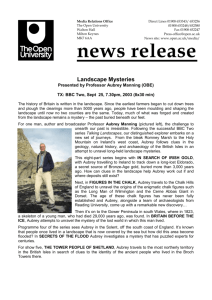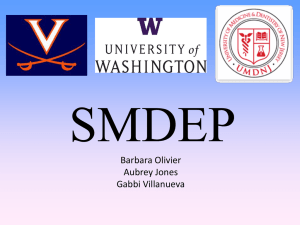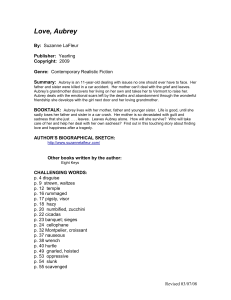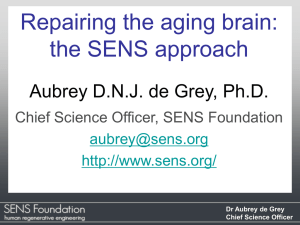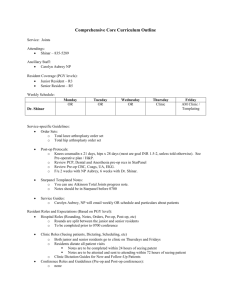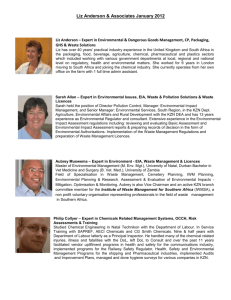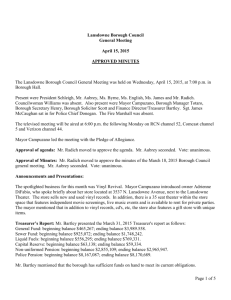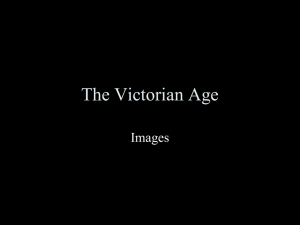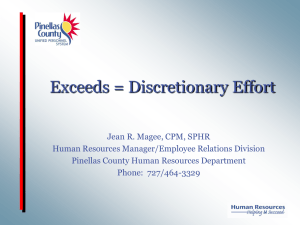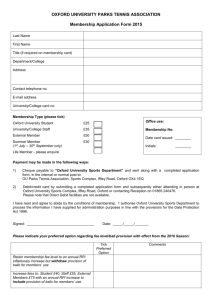O12P671LHW John Aubrey student reading list
advertisement
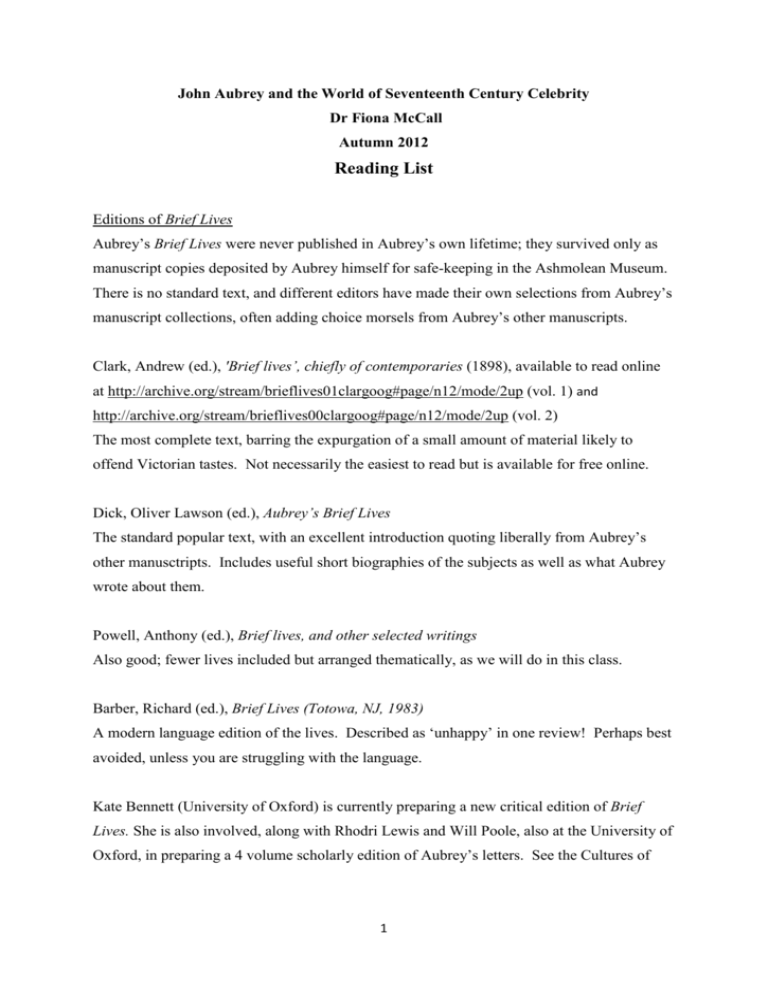
John Aubrey and the World of Seventeenth Century Celebrity Dr Fiona McCall Autumn 2012 Reading List Editions of Brief Lives Aubrey’s Brief Lives were never published in Aubrey’s own lifetime; they survived only as manuscript copies deposited by Aubrey himself for safe-keeping in the Ashmolean Museum. There is no standard text, and different editors have made their own selections from Aubrey’s manuscript collections, often adding choice morsels from Aubrey’s other manuscripts. Clark, Andrew (ed.), 'Brief lives’, chiefly of contemporaries (1898), available to read online at http://archive.org/stream/brieflives01clargoog#page/n12/mode/2up (vol. 1) and http://archive.org/stream/brieflives00clargoog#page/n12/mode/2up (vol. 2) The most complete text, barring the expurgation of a small amount of material likely to offend Victorian tastes. Not necessarily the easiest to read but is available for free online. Dick, Oliver Lawson (ed.), Aubrey’s Brief Lives The standard popular text, with an excellent introduction quoting liberally from Aubrey’s other manusctripts. Includes useful short biographies of the subjects as well as what Aubrey wrote about them. Powell, Anthony (ed.), Brief lives, and other selected writings Also good; fewer lives included but arranged thematically, as we will do in this class. Barber, Richard (ed.), Brief Lives (Totowa, NJ, 1983) A modern language edition of the lives. Described as ‘unhappy’ in one review! Perhaps best avoided, unless you are struggling with the language. Kate Bennett (University of Oxford) is currently preparing a new critical edition of Brief Lives. She is also involved, along with Rhodri Lewis and Will Poole, also at the University of Oxford, in preparing a 4 volume scholarly edition of Aubrey’s letters. See the Cultures of 1 Knowledge website: at http://cofk.history.ox.ac.uk/projects/john-aubrey/ where you can search a database of seventeenth century correspondence. Aubrey’s other writings Miscellanies, (London 1721), http://www.gutenberg.org The only work Aubrey published in his own lifetime, it concerns supernatural manifestations. Lawson Dick quotes liberally from this in his introduction. Remaines of Gentilisme and Judaisme, ed. J. Brittain (London, 1881) http://archive.org/details/remainesgentili01aubrgoog Aubrey’s unpublished collection of material on folklore and customs. The Natural History of Wiltshire by John Aubrey (London 1847; New York 1969), http://www.gutenberg.org One of the works on which Aubrey’s reputation as an antiquary and archaeologist rests. John Aubrey’s Life and Work Powell, Anthony, John Aubrey and his Friends As you might expect from this well-known author, a very readable and accessible biography of Aubrey. Contains useful sections on Aubrey’s friends and a list of all his publications. Hunter, Michael, John Aubrey and the Realm of Learning (London, 1975) An excellent book, concentrating on Aubrey’s contribution to the intellectual developments of the seventeenth century. Kate Bennett (see above) is also interested in furthering the rediscovery of Aubrey’s reputation. See http://royalsociety.org/events/2011/john-aubrey/ for an excellent audio podcast of a lecture on John Aubrey she gave recently to the Royal Society. John Aubrey and the Development of Experimental Science, Online Exhibition, http://www.bodleian.ox.ac.uk/about/exhibitions/online/aubrey Baume, Maurice, Two Antiquaries: A selection from the correspondence of John Aubrey and Anthony Wood (Edinburgh, 2001) 2 ‘Wiltshire: the topographical collections of John Aubrey’, ed. J. E. Jackson, Wiltshire Archaeological and Natural History Society, 1 (1862) Biography The Oxford Dictionary of National Biography can be searched from the University of Oxford library OXLIP website on computers in Ewert House and in the Continuing Education Library The Early English Books Database (EEBO). If you are interested in reading the published works of one of Aubrey’s subjects. e.g. Hobbes, Leviathan, Hooke, Micrographia seventeenth century published editions will be available to download from this database, also searchable via OXLIP at Ewert House nd in the Continuing Education Library. Clark, A., The Life and Times of Anthony Wood, Oxford (1891), 5 vols http://archive.org/details/lifeandtimesant00clargoog The diary and writings of Aubrey’s erstwhile friend and collaborator on the Brief Lives. Anderson, Judith H., Biographical Truth: The Representation of Historical Persons in TudorStuart Writing (New Haven, 1984) Stauffer, Donald, English Biography Before 1700 (Cambridge, Mass, 1930) Wendorf, R., The elements of life: biography and portrait-painting in Stuart and Georgian England (Oxford, 1990) The Seventeenth Century in General Hutton, R., The Restoration (Oxford, 1986) Coward, B., The Stuart Age: England 1603-1714 (4th Edition, 2011) Wormald, J. (ed.), The Seventeenth Century, (Oxford, 2008) Seventeenth Century Art and Culture Ashley, Maurice, The Golden Century: Europe, 1598-1715 (London) Foskett, Daphne, Samuel Cooper and his Contemporaries (London, 1974) Healy, T., Sawday, T., Literature and the English Civil War (Cambridge, 1990) 3 Keeble, N.H. (ed.) The Cambridge Companion to Writing of the English Revolution (Cambridge, 2001) Parry, Graham, The Seventeenth Century: the Intellectual and Cultural Context of English literature, 1603-1700 (London, 1989) Smith, Nigel, Literature and the English Civil War (New Haven, 1992) Strong, Roy, The Spirit of Britain: a Narrative History of the Arts (London, 2000) – excellent on the visual arts, but there are occasional factual errors (e.g. lumping Thomas Traherne, who was only born in 1637, with the cavalier poets!) The Supernatural Thomas, Keith, Religion and the Decline of Magic (London, 1971) – a classic work William Lilly’s history of his own times: from the year 1602 to 1681 (London, 1715) http://archive.org/details/williamlillyshis00lill Walsham, A., Providence in Early Modern England (Oxford, 2001) Seventeenth Century Science Spratt, T., History of the Royal Society (1667) http://archive.org/details/historyroyalsoc00martgoog Royal Society Website at http://royalsociety.org/about-us/history/1600s/ includes a timeline and articles on some of their most famous early experiments. Gribbin, J., The Fellowship: The Story of a Revolution (London, 2005) – excellent, readable account of the development of science in 17th century England, with clear explanations of the science as well as interesting accounts of the lives of Bacon, Harvey, Hooke and others. Seventeenth Century Antiquarianism Currie, C.R.J., Lewis, C.P., A Guide to English County Histories (Stroud, 1997) Woolf, Daniel, The Social Circulation of the Past (Oxford, 2003) Woolf, Daniel, ‘The Common Voice: History, Folklore and Oral Tradition in Early Modern England’, Past and Present 120 (1988), pp. 26-52 4 Readings from Aubrey Week by Week Week 2: Literary Anecdotes Read lives of Milton, Erasmus, Thomas More, Walter Raleigh and (if you have time) Aubrey’s longer biography of his friend the philosopher Thomas Hobbes. Week 3: the Supernatural Read lives of John Dee, the Duke of Buckingham and William Oughtred. Week 4: Science Read lives of Sir Frances Bacon, Sir William Petty, Francis Potter and Robert Hooke Week 5: Doctors and Lawyers Read lives of William Harvey, William Butler, Sir Edward Coke and John Selden Week 6: Commerce and Exploration Read lives of Walter Raleigh, the Earl of Cumberland, Thomas Stump and Thomas Chaloner. Week 7: The Civil War and the Interregnum Read lives of David Jenkins, Lord Falkland, James Harrington and General Monck Week 8: Religion Read lives of Lancelot Andrews, Richard Corbet, William Chillingworth, Seth Ward, William Prynne and William Penn Week 9: Women and Society, Aubrey’s friends Read lives of Mary Herbert, Countess of Pembroke, Elizabeth Broughton, Venetia Digby, Katherine Philips, Mary, Countess of Warwick and Edward Davenant Week 10: Antiquarianism Read lives of William Camden, Henry Spelman, Thomas Stampe and Silas Taylor and ‘The Olden Time’ (if you have the Powell edition). 5
